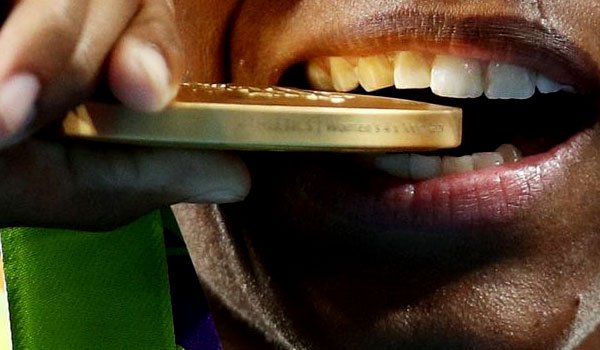Members of Japan's Olympic organising committee tabled the idea to government officials and companies earlier this year, local media reports said.
Olympic host cities have traditionally obtained the metal from mining firms.
But Japan, which lacks its own mineral resources, is keen to take the theme of a sustainable future a step further.
The International Olympic Committee (IOC) has developed strict criteria for the world's greatest sporting event, and this extends to how the medals should be produced.
The Rio Olympics, for example, used gold that was extracted without the use of mercury and a third of the silver and bronze used came from recycled sources.
How does e-waste recycling work?
Discarded consumer electronics such as smartphones and tablets contain small amounts of precious and rare earth metals, including platinum, palladium, gold, silver, lithium, cobalt and nickel.
Scrap cars and home appliances such as fridges and air conditioners also contain these rarer metals, along with base metals, including iron, copper, lead and zinc.
Recycling or refining companies either collect or purchase tons of this e-waste and industrial scraps. They then use chemical processes to separate the various metals.
Much of this work takes place in developing countries such as China, India and Indonesia.
Does Japan have enough for 2020?
Japan has one of the highest recycling rates in Asia, according to OECD data. However, this mainly applies to plastic, paper and glass.
About 650,000 tonnes of small electronics and home appliances are discarded in Japan every year, the Nikkei newspaper said. However, it is estimated that less than 100,000 tonnes is collected for recycling.
So for the 2020 Games, Japan will probably have to ask individual countries or companies to contribute towards the recycled metal collection effort.
How much metal is needed?
The amount of metal needed will depend on the size and number of medals, since each year, they seem to get bigger and heavier.
Five new sports have also been added to the Tokyo 2020 competition, including baseball, karate, skateboarding, sport climbing and surfing.
The 2016 Rio Olympics had the largest medals of any games, weighing in at 500g each and 1cm thick in the middle.
The Brazilian Mint produced 5,130 medals in total, up from the 4,700 made by London's Royal Mint for the 2012 Games.
How much will it cost?
It may end up being cheaper using recycled metals than buying it on the spot market.
A little-known fact is that the gold medals are mostly made out of sterling silver and the bronze metals are mostly made out of copper.
Isn't that rather sneaky?
The IOC minimum requirement for a gold medal is 6g of the pure yellow metal.
If the medals were made of pure gold, the overall cost would run into tens of millions of dollars.
Gold is currently about 70 times more expensive than silver. But some market experts think that may change by 2020.
Global silver reserves continue to shrink as demand is exceeding supply and we mine only 11oz of silver for each ounce of gold, said Gregor Gregersen, the founder of Silver Bullion in Singapore.
(bbc.com)






